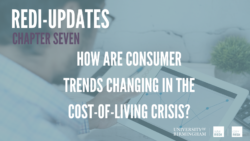The latest edition of REDI-Updates is out now – providing expert data insights and clear policy guidance. In this edition, the WMREDI team investigates what factors are contributing to the cost-of-living crisis and the impact it is having on households, businesses, public services and the third sector. We also look at how the crisis in … Continue reading “REDI-Updates: How are Consumer Trends Changing in the Cost-Of-Living Crisis?”
Author: Juliane Schwarz
Innovation Policy: The Role of Universities, Priority Sectors and Micro-enterprises
Juliane Schwarz discusses the potential impacts of prioritising certain sectors over others and how universities can play a role in active industrial policy. Juliane also looks at the role of small and micro businesses in our economy and how they can be better supported. In her letter to the Financial Times, the Vice-Provost of Research … Continue reading “Innovation Policy: The Role of Universities, Priority Sectors and Micro-enterprises”
WMREDI Policy Briefing – STEM Assets in the West Midlands Innovation Landscape: STEAMhouse
In this policy briefing, Juliane Schwarz discusses the STEAMhouse, a Birmingham City University (BCU) asset, exploring its contribution to improving economic performance and social inequality in our region. Special thanks to Professor Joanna Birch, Director of Innovation, Enterprise and Employability at Birmingham City University, and STEAMhouse staff for their contributions. What are the benefits of … Continue reading “WMREDI Policy Briefing – STEM Assets in the West Midlands Innovation Landscape: STEAMhouse”
International Women’s Day: Female Entrepreneurship in the UK
In celebration of International Women’s Day, Juliane Schwarz looks at how females in the UK are represented in business as entrepreneurs. This blog is part of an International Women’s Day series. Females account for one in three entrepreneurs in the UK. The Female Founder Forum describes in One in a Million that similar economies such as … Continue reading “International Women’s Day: Female Entrepreneurship in the UK”
University-Industry Relationships Facilitated: The Case of Greater Birmingham and Solihull Local Enterprise Partnership Growth Hub
Our newly released report discusses how business support offered by regional universities is facilitated by a local partner, the Greater Birmingham and Solihull Local Enterprise Partnership (GBSLEP) Growth Hub. The report aims to demonstrate how close links between regional economic development bodies and anchor institutions, such as universities, helps to support businesses in the GBSLEP … Continue reading “University-Industry Relationships Facilitated: The Case of Greater Birmingham and Solihull Local Enterprise Partnership Growth Hub”
Clean Growth Case Study: Greater Birmingham and Solihull Local Enterprise Partnership (GBSLEP) and Tyseley Energy Park
In this policy briefing, Dr Juliane Schwarz examines the value and function of public funding by the Greater Birmingham and Solihull Local Enterprise Partnership (GBSLEP) into clean growth initiatives, such as Tyseley Energy Park (TEP), and how this supports clean growth in the West Midlands to become a net zero carbon economy by 2041. This … Continue reading “Clean Growth Case Study: Greater Birmingham and Solihull Local Enterprise Partnership (GBSLEP) and Tyseley Energy Park”
Labour Market Disconnect in the West Midlands
In this blog, Dr Juliane Schwarz summarises the key issues on why there are currently high levels of unemployment in the region, whilst at the same time, record numbers of vacancies for jobs and apprenticeships. View the full policy briefing on the labour market disconnect. The research is a response to a query by the … Continue reading “Labour Market Disconnect in the West Midlands”
Accelerator Programmes and the COVID-19 Pandemic
Dr Juliane Schwarz presents the findings from a study examining the effects of COVID-19 and nationwide lockdowns on an accelerator programme based in London, and how the move to online provision has impacted their work. Accelerators are start-up programmes that bring entrepreneurs together, face-to-face, for intensive interaction with experts and other entrepreneurs. As cities in … Continue reading “Accelerator Programmes and the COVID-19 Pandemic”
University Incubators as Part of a Wider Regional Innovation System
Dr Juliane Schwarz looks at the differences between incubators and accelerators, how they support fledgling businesses to grow, and the role universities can play in this process. This blog is an introduction to the WM REDI project “University Incubator: Comparative Analysis, Pathways to Impact and Relative Regional Effects“. The project investigates university incubators and, as … Continue reading “University Incubators as Part of a Wider Regional Innovation System”
University-Industry Relationships and Spill-over Effects in the West Midlands: The Case of the ARLI Collaborative Research Project
Dr Juliane Schwarz discusses the role initiatives can play in transferring knowledge from Universities to Industry, looking specifically at the ARLI programme. This blog is an introduction to the WMREDI project “University-Industry Relationships and Spillover Effects”. The project aims to increase our understanding of university knowledge commercialisation pathways building on existing research in the … Continue reading “University-Industry Relationships and Spill-over Effects in the West Midlands: The Case of the ARLI Collaborative Research Project”










